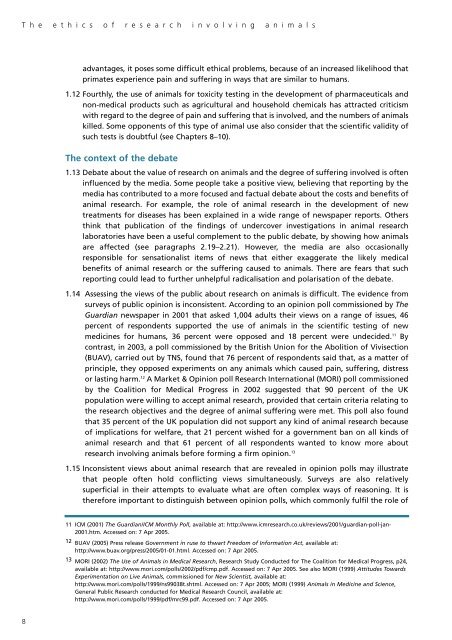The ethics of research involving animals - Nuffield Council on ...
The ethics of research involving animals - Nuffield Council on ...
The ethics of research involving animals - Nuffield Council on ...
You also want an ePaper? Increase the reach of your titles
YUMPU automatically turns print PDFs into web optimized ePapers that Google loves.
T h e e t h i c s o f r e s e a r c h i n v o l v i n g a n i m a l s<br />
advantages, it poses some difficult ethical problems, because <str<strong>on</strong>g>of</str<strong>on</strong>g> an increased likelihood that<br />
primates experience pain and suffering in ways that are similar to humans.<br />
1.12 Fourthly, the use <str<strong>on</strong>g>of</str<strong>on</strong>g> <str<strong>on</strong>g>animals</str<strong>on</strong>g> for toxicity testing in the development <str<strong>on</strong>g>of</str<strong>on</strong>g> pharmaceuticals and<br />
n<strong>on</strong>-medical products such as agricultural and household chemicals has attracted criticism<br />
with regard to the degree <str<strong>on</strong>g>of</str<strong>on</strong>g> pain and suffering that is involved, and the numbers <str<strong>on</strong>g>of</str<strong>on</strong>g> <str<strong>on</strong>g>animals</str<strong>on</strong>g><br />
killed. Some opp<strong>on</strong>ents <str<strong>on</strong>g>of</str<strong>on</strong>g> this type <str<strong>on</strong>g>of</str<strong>on</strong>g> animal use also c<strong>on</strong>sider that the scientific validity <str<strong>on</strong>g>of</str<strong>on</strong>g><br />
such tests is doubtful (see Chapters 8–10).<br />
<str<strong>on</strong>g>The</str<strong>on</strong>g> c<strong>on</strong>text <str<strong>on</strong>g>of</str<strong>on</strong>g> the debate<br />
1.13 Debate about the value <str<strong>on</strong>g>of</str<strong>on</strong>g> <str<strong>on</strong>g>research</str<strong>on</strong>g> <strong>on</strong> <str<strong>on</strong>g>animals</str<strong>on</strong>g> and the degree <str<strong>on</strong>g>of</str<strong>on</strong>g> suffering involved is <str<strong>on</strong>g>of</str<strong>on</strong>g>ten<br />
influenced by the media. Some people take a positive view, believing that reporting by the<br />
media has c<strong>on</strong>tributed to a more focused and factual debate about the costs and benefits <str<strong>on</strong>g>of</str<strong>on</strong>g><br />
animal <str<strong>on</strong>g>research</str<strong>on</strong>g>. For example, the role <str<strong>on</strong>g>of</str<strong>on</strong>g> animal <str<strong>on</strong>g>research</str<strong>on</strong>g> in the development <str<strong>on</strong>g>of</str<strong>on</strong>g> new<br />
treatments for diseases has been explained in a wide range <str<strong>on</strong>g>of</str<strong>on</strong>g> newspaper reports. Others<br />
think that publicati<strong>on</strong> <str<strong>on</strong>g>of</str<strong>on</strong>g> the findings <str<strong>on</strong>g>of</str<strong>on</strong>g> undercover investigati<strong>on</strong>s in animal <str<strong>on</strong>g>research</str<strong>on</strong>g><br />
laboratories have been a useful complement to the public debate, by showing how <str<strong>on</strong>g>animals</str<strong>on</strong>g><br />
are affected (see paragraphs 2.19–2.21). However, the media are also occasi<strong>on</strong>ally<br />
resp<strong>on</strong>sible for sensati<strong>on</strong>alist items <str<strong>on</strong>g>of</str<strong>on</strong>g> news that either exaggerate the likely medical<br />
benefits <str<strong>on</strong>g>of</str<strong>on</strong>g> animal <str<strong>on</strong>g>research</str<strong>on</strong>g> or the suffering caused to <str<strong>on</strong>g>animals</str<strong>on</strong>g>. <str<strong>on</strong>g>The</str<strong>on</strong>g>re are fears that such<br />
reporting could lead to further unhelpful radicalisati<strong>on</strong> and polarisati<strong>on</strong> <str<strong>on</strong>g>of</str<strong>on</strong>g> the debate.<br />
1.14 Assessing the views <str<strong>on</strong>g>of</str<strong>on</strong>g> the public about <str<strong>on</strong>g>research</str<strong>on</strong>g> <strong>on</strong> <str<strong>on</strong>g>animals</str<strong>on</strong>g> is difficult. <str<strong>on</strong>g>The</str<strong>on</strong>g> evidence from<br />
surveys <str<strong>on</strong>g>of</str<strong>on</strong>g> public opini<strong>on</strong> is inc<strong>on</strong>sistent. According to an opini<strong>on</strong> poll commissi<strong>on</strong>ed by <str<strong>on</strong>g>The</str<strong>on</strong>g><br />
Guardian newspaper in 2001 that asked 1,004 adults their views <strong>on</strong> a range <str<strong>on</strong>g>of</str<strong>on</strong>g> issues, 46<br />
percent <str<strong>on</strong>g>of</str<strong>on</strong>g> resp<strong>on</strong>dents supported the use <str<strong>on</strong>g>of</str<strong>on</strong>g> <str<strong>on</strong>g>animals</str<strong>on</strong>g> in the scientific testing <str<strong>on</strong>g>of</str<strong>on</strong>g> new<br />
medicines for humans, 36 percent were opposed and 18 percent were undecided. 11 By<br />
c<strong>on</strong>trast, in 2003, a poll commissi<strong>on</strong>ed by the British Uni<strong>on</strong> for the Aboliti<strong>on</strong> <str<strong>on</strong>g>of</str<strong>on</strong>g> Vivisecti<strong>on</strong><br />
(BUAV), carried out by TNS, found that 76 percent <str<strong>on</strong>g>of</str<strong>on</strong>g> resp<strong>on</strong>dents said that, as a matter <str<strong>on</strong>g>of</str<strong>on</strong>g><br />
principle, they opposed experiments <strong>on</strong> any <str<strong>on</strong>g>animals</str<strong>on</strong>g> which caused pain, suffering, distress<br />
or lasting harm. 12 A Market & Opini<strong>on</strong> poll Research Internati<strong>on</strong>al (MORI) poll commissi<strong>on</strong>ed<br />
by the Coaliti<strong>on</strong> for Medical Progress in 2002 suggested that 90 percent <str<strong>on</strong>g>of</str<strong>on</strong>g> the UK<br />
populati<strong>on</strong> were willing to accept animal <str<strong>on</strong>g>research</str<strong>on</strong>g>, provided that certain criteria relating to<br />
the <str<strong>on</strong>g>research</str<strong>on</strong>g> objectives and the degree <str<strong>on</strong>g>of</str<strong>on</strong>g> animal suffering were met. This poll also found<br />
that 35 percent <str<strong>on</strong>g>of</str<strong>on</strong>g> the UK populati<strong>on</strong> did not support any kind <str<strong>on</strong>g>of</str<strong>on</strong>g> animal <str<strong>on</strong>g>research</str<strong>on</strong>g> because<br />
<str<strong>on</strong>g>of</str<strong>on</strong>g> implicati<strong>on</strong>s for welfare, that 21 percent wished for a government ban <strong>on</strong> all kinds <str<strong>on</strong>g>of</str<strong>on</strong>g><br />
animal <str<strong>on</strong>g>research</str<strong>on</strong>g> and that 61 percent <str<strong>on</strong>g>of</str<strong>on</strong>g> all resp<strong>on</strong>dents wanted to know more about<br />
<str<strong>on</strong>g>research</str<strong>on</strong>g> <str<strong>on</strong>g>involving</str<strong>on</strong>g> <str<strong>on</strong>g>animals</str<strong>on</strong>g> before forming a firm opini<strong>on</strong>. 13<br />
1.15 Inc<strong>on</strong>sistent views about animal <str<strong>on</strong>g>research</str<strong>on</strong>g> that are revealed in opini<strong>on</strong> polls may illustrate<br />
that people <str<strong>on</strong>g>of</str<strong>on</strong>g>ten hold c<strong>on</strong>flicting views simultaneously. Surveys are also relatively<br />
superficial in their attempts to evaluate what are <str<strong>on</strong>g>of</str<strong>on</strong>g>ten complex ways <str<strong>on</strong>g>of</str<strong>on</strong>g> reas<strong>on</strong>ing. It is<br />
therefore important to distinguish between opini<strong>on</strong> polls, which comm<strong>on</strong>ly fulfil the role <str<strong>on</strong>g>of</str<strong>on</strong>g><br />
11 ICM (2001) <str<strong>on</strong>g>The</str<strong>on</strong>g> Guardian/ICM M<strong>on</strong>thly Poll, available at: http://www.icm<str<strong>on</strong>g>research</str<strong>on</strong>g>.co.uk/reviews/2001/guardian-poll-jan-<br />
2001.htm. Accessed <strong>on</strong>: 7 Apr 2005.<br />
12 BUAV (2005) Press release Government in ruse to thwart Freedom <str<strong>on</strong>g>of</str<strong>on</strong>g> Informati<strong>on</strong> Act, available at:<br />
http://www.buav.org/press/2005/01-01.html. Accessed <strong>on</strong>: 7 Apr 2005.<br />
13 MORI (2002) <str<strong>on</strong>g>The</str<strong>on</strong>g> Use <str<strong>on</strong>g>of</str<strong>on</strong>g> Animals in Medical Research, Research Study C<strong>on</strong>ducted for <str<strong>on</strong>g>The</str<strong>on</strong>g> Coaliti<strong>on</strong> for Medical Progress, p24,<br />
available at: http://www.mori.com/polls/2002/pdf/cmp.pdf. Accessed <strong>on</strong>: 7 Apr 2005. See also MORI (1999) Attitudes Towards<br />
Experimentati<strong>on</strong> <strong>on</strong> Live Animals, commissi<strong>on</strong>ed for New Scientist, available at:<br />
http://www.mori.com/polls/1999/ns99038t.shtml. Accessed <strong>on</strong>: 7 Apr 2005; MORI (1999) Animals in Medicine and Science,<br />
General Public Research c<strong>on</strong>ducted for Medical Research <str<strong>on</strong>g>Council</str<strong>on</strong>g>, available at:<br />
http://www.mori.com/polls/1999/pdf/mrc99.pdf. Accessed <strong>on</strong>: 7 Apr 2005.<br />
8
















